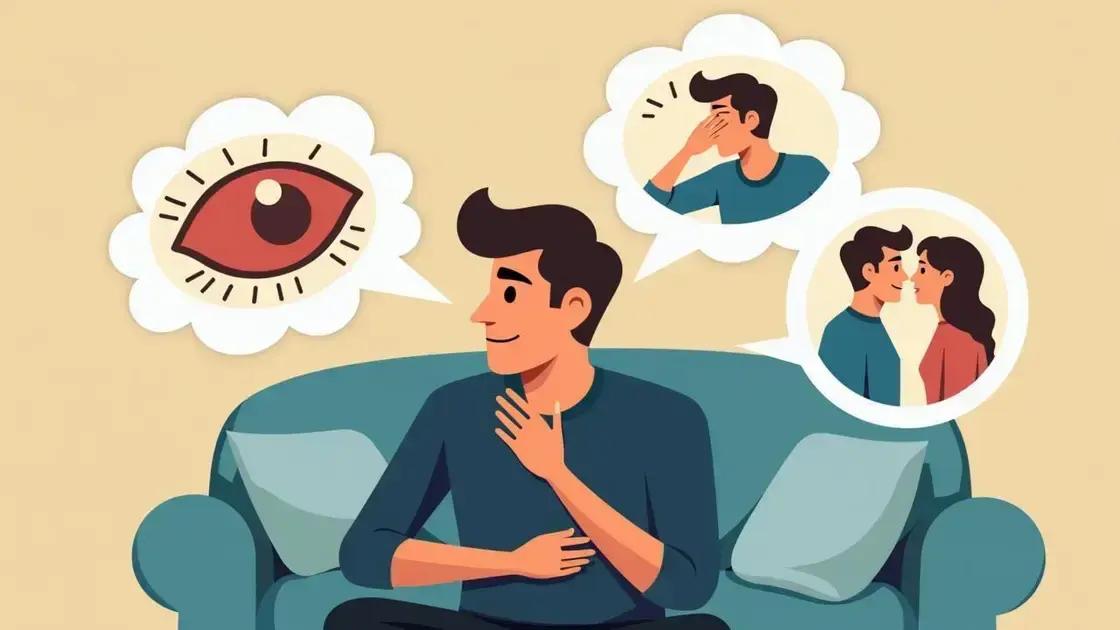Erectile dysfunction (ED) affects men’s perceptions of masculinity by leading to feelings of inadequacy, anxiety, and decreased sexual confidence. It can strain relationships due to the emotional weight it carries, necessitating open communication and support. Seeking help through therapy or support groups is crucial for managing the psychological impacts of ED and rebuilding intimacy.
How does erectile dysfunction affect masculinity perceptions? This question resonates with many men facing the psychological and emotional challenges of ED. Society often associates masculinity with sexual performance, which can lead to devastating effects on a man’s self-esteem and relationships. In this article, we will delve into the various dimensions of this issue, including cultural perceptions of masculinity, the psychological impacts of erectile dysfunction, and the importance of seeking help. Understanding these factors is crucial in reshaping narratives around masculinity and promoting healthier conversations.
Understanding Erectile Dysfunction

Erectile dysfunction (ED) is a condition that affects many men, often leading to feelings of shame and anxiety. Understanding the causes and implications of ED can help in addressing its effects on masculinity perceptions.
What is Erectile Dysfunction?
ED refers to the inability to achieve or maintain an erection suitable for sexual activity. This condition can stem from various physical and psychological factors, including but not limited to hormonal imbalances, cardiovascular problems, stress, and anxiety.
Physical Causes of ED
One major aspect of ED includes physical issues. Conditions like diabetes, high blood pressure, and obesity can significantly affect blood flow, which is crucial for achieving an erection. Medications and substance abuse can further complicate these issues.
Psychological Causes of ED
On the other hand, psychological factors such as stress, depression, and performance anxiety also play a critical role. These mental hurdles can create a cycle where anxiety about sexual performance leads to erectile issues, which, in turn, increases anxiety.
Age and Erectile Dysfunction
While ED can affect men of all ages, its prevalence increases with age. Many older men may experience changes in sexual function due to natural physiological changes, leading to greater psychological impacts related to masculinity.
The Importance of Understanding ED
Understanding erectile dysfunction is essential not only for addressing personal challenges but also for breaking the stigma associated with it. Recognizing that this is a common issue can help foster open discussions and promote healthier attitudes towards masculinity.
Cultural Perceptions of Masculinity

Cultural perceptions of masculinity have a profound influence on how men experience erectile dysfunction (ED). Society often has rigid expectations of what it means to be a man. These expectations can shape a man’s self-image and the way he responds to challenges, including sexual health issues.
The Traditional View of Masculinity
Traditionally, masculinity is associated with strength, dominance, and sexual prowess. Men are often taught that their worth is tied to their ability to perform sexually. This view can create significant pressure, especially when faced with a condition like ED.
Impact of Media and Stereotypes
Media representations play a crucial role in shaping these cultural perceptions. Movies, advertisements, and social media often glorify idealized male figures who are always confident and in control. This portrayal can lead to feelings of inadequacy in men who struggle with ED, as they may feel they fall short of societal ideals.
The Role of Communication
Communication about masculinity and ED is essential. However, stigma often prevents open discussions. Many men feel embarrassed or ashamed to bring it up, further isolating them in their struggle. Breaking down these barriers can lead to healthier attitudes about masculinity.
Changing Definitions of Masculinity
Fortunately, perceptions of masculinity are evolving. There is a growing recognition that vulnerability and emotional openness are also strengths. New movements are encouraging men to embrace a more holistic view of masculinity that includes mental health and emotional wellness, helping to reduce the stigma surrounding ED.
Conclusion
Understanding the cultural perceptions of masculinity can help men grapple with the challenges of ED. By redefining what it means to be masculine, society can support men in overcoming the stigma associated with this common issue.
The Psychological Impact of ED

The psychological impact of erectile dysfunction (ED) can be profound, affecting a man’s self-esteem and mental health. Many men experience feelings of inadequacy, anxiety, and depression when faced with this condition.
Self-Esteem and Identity
ED can severely dent a man’s self-image. When sexual performance is tied to masculinity, any issue related to it can lead to a negative self-perception. Men may begin to see themselves as less masculine, which can create a vicious cycle of low self-esteem and worsening erectile issues.
Anxiety and Stress
Anxiety plays a dual role in the experience of ED. Men might feel anxious about the possibility of erectile failure, leading to performance anxiety. This stress can diminish sexual desire and create a fear of intimacy, further complicating their sexual health.
Impact on Relationships
ED can place a strain on relationships. Partners might feel neglected or frustrated, and the lack of communication can exacerbate misunderstandings. Men may withdraw emotionally from their partners to avoid the stress of discussing their condition, resulting in a breakdown of intimacy.
Depression and Social Isolation
For some men, the ongoing struggle with ED can lead to depression. Feelings of inadequacy may cause men to shy away from social interactions and avoid situations that might remind them of their condition. This isolation can compound their psychological distress.
The Importance of Open Dialogue
Addressing the psychological impact of ED requires open communication. Men should feel encouraged to discuss their feelings with trusted friends, partners, or professionals. Seeking help not only aids in managing the psychological effects but can also facilitate healthier relationships and regain confidence.
Relationships and Sexual Confidence

Relationships and sexual confidence are closely intertwined, especially for men experiencing erectile dysfunction (ED). ED can create significant challenges that affect both intimacy and confidence within relationships.
The Link Between Confidence and Intimacy
When a man struggles with ED, his sexual confidence may take a hit. This can manifest as hesitance to engage in sexual activities or intimacy with a partner. Feeling insecure about sexual performance can lead men to avoid situations where they might feel vulnerable. This avoidance can strain relationships, as intimacy becomes compromised.
Communicating with Partners
Effective communication is crucial for maintaining healthy relationships. Men should aim to discuss their feelings and challenges openly with their partners. When partners understand the situation, it can foster support and empathy, which are vital for building confidence. Additionally, partners can reassure and affirm that love and attraction are not solely based on sexual performance.
Rebuilding Sexual Confidence
Working on sexual confidence involves both self-reflection and active engagement in the relationship. Engaging in non-sexual intimacy can help couples feel connected without the pressure of sexual performance. Activities such as cuddling, talking, or even holding hands can reinforce emotional bonds and improve confidence in the bedroom.
The Role of Therapy and Support
Therapy can be an excellent resource for individuals and couples dealing with the effects of ED on relationships. Professional guidance can help address emotional barriers and improve communication skills. Furthermore, joining support groups can provide comfort and connection by sharing experiences with others facing similar challenges.
Creating a Positive Environment
It’s essential to create a safe and supportive space for intimacy. Partners should work together to cultivate an atmosphere that encourages openness, acceptance, and understanding. Removing the performance pressure can help men gradually regain their sexual confidence and strengthen the bond with their partner.
Seeking Help and Support for ED

Seeking help and support for erectile dysfunction (ED) is a vital step toward improving both physical health and emotional well-being. Many men hesitate to ask for help due to stigma and fear of judgment. However, realizing that ED is a common issue can encourage more open discussions.
Recognizing the Need for Help
Understanding when to seek help is crucial. If ED persists for more than a few weeks or begins to affect relationships, it’s time to consult a healthcare professional. Men should remember that health providers are trained to discuss these issues sensitively and confidentially.
Types of Help Available
There are numerous avenues for treatment and support. Options may include therapy, medication, lifestyle changes, or a combination of these. Mental health professionals can provide counseling to address underlying psychological factors, while medical professionals can suggest treatments like pills or therapy.
Communicating with Healthcare Providers
When speaking with a doctor, it’s essential to be honest about symptoms and concerns. Men should prepare for their appointments by noting any relevant experiences or feelings related to sexual health. This information helps healthcare providers offer the most appropriate advice and treatment options.
Support from Partners and Friends
Support from partners or close friends can make a significant difference. Having someone to talk to about experiences with ED can alleviate feelings of isolation. Partners can also play a role by encouraging discussions about intimacy and providing reassurance.
Online Resources and Support Groups
Many online resources and forums offer additional support and information. These platforms allow men to connect with others facing similar challenges. Peer support can provide encouragement and help reduce feelings of shame associated with ED.
Understanding and Addressing Erectile Dysfunction’s Impact
Erectile dysfunction (ED) is more than just a physical condition; it heavily influences perceptions of masculinity and can significantly strain relationships. By understanding the psychological impacts of ED, men can begin to address feelings of inadequacy and build healthier connections with their partners.
Open communication, seeking help, and accessing support resources are essential steps in overcoming the challenges posed by ED. By breaking down stigma and fostering supportive environments, individuals can not only enhance their sexual health but also redefine their perceptions of masculinity.
It is important for men to remember that they are not alone in this journey and that various resources are available to help them reclaim their confidence and intimacy.
FAQ – Frequently Asked Questions about Erectile Dysfunction and Masculinity
What is erectile dysfunction (ED)?
Erectile dysfunction (ED) is the inability to achieve or maintain an erection suitable for sexual activity, which can be caused by physical or psychological factors.
How does ED affect masculinity perceptions?
ED can significantly impact a man’s self-esteem and identity, leading to feelings of inadequacy and shame due to societal expectations around masculinity.
What are the psychological impacts of ED?
The psychological impacts of ED can include anxiety, stress, depression, and a decrease in sexual confidence, which can strain relationships.
How can I support a partner facing ED?
Supporting a partner involves open communication, expressing empathy, and encouraging them to seek help. It’s important to reassure them that love and attraction extend beyond sexual performance.
What resources are available for coping with ED?
Resources for coping with ED include support groups, counseling services, and websites that provide information and connect men to others facing similar challenges.
When should someone seek professional help for ED?
It’s advisable to seek professional help if ED persists for several weeks, begins to affect relationships, or leads to significant emotional distress.












